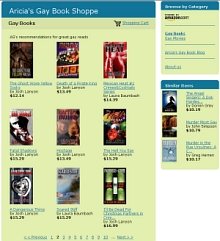Gay in a difficult future: China Mountain Zhang
 Maureen F. McHugh made her novel debut with China Mountain Zhang way back in 1992, and you can see what the cover blurb says! The New York Times: "A first novel this good gives every reader the chance to share in the pleasure of discovery." And back in those days, we were convinced Ms McHugh would be back with a new one just like it every year. This is very close to my kind of SF, and I was one of those hoping for a shelf of McHughs...
Maureen F. McHugh made her novel debut with China Mountain Zhang way back in 1992, and you can see what the cover blurb says! The New York Times: "A first novel this good gives every reader the chance to share in the pleasure of discovery." And back in those days, we were convinced Ms McHugh would be back with a new one just like it every year. This is very close to my kind of SF, and I was one of those hoping for a shelf of McHughs...
It didn't happen. There are still only four McHugh novels (sorry, folks: I'm not much of a fan of short fiction. I need something I can sink my teeth into) ... and the thing is, her novels sell so well, she probably doesn't need to write any more often than this! Here is her Wiki page on which her occupation is quotes as "writer, novelist" -- and this tells you how well her books sell. Four novels in seventeen years is a major success story.
And it all started right here: China Mountain Zhang, though if you take another look at it, it's not really a novel at all. It's nine segments that range in length from short story to novella ... and all of them twine around each other and around the main character of Zhang. It's an amazing framework for a novel, if you can call China... a novel, and I'm going to, because the whole thing harmonizes in my memory as a single work, 312pp long.
It's the 22nd century, and China dominates the world in population, culture, technology, the lot. The best of everything is in China and everybody wants to go there. The world is in the process of deliberately Chinese-izing itself, just as the 20th century was all about Americanization (due to the influence of Hollywood, I suspect).
Interestingly, 150 years from now, China is still a communist body ... and not one darned thing has really changed, culturally. Meaning, Zhang has big problems. He's gay.
(Right here, divorce yourself from the cultural developments of the last 17 years since the book was put out by Tor ... the fact is that by 2009 Chinese gays are coming out whether the government likes it or not. There are great big websites like Gay China -- the link I just gave you is to the English language page. Forget about all this when you read China Mountain Zhang -- or imagine that the current trend has been totally reversed, and by 2100 China is as dead-set against its enormous GLBTI community as it ever was. Not a pleasant thought but inside the parameters of this novel, I guess it happened.)
It's very hard to nail down what the storyline of China Mountain Zhang is! There are threads coming in from this angle and that angle ... it's not linear ... it doesn't follow a single plotline for long enough for this to be called the story of the book as a whole. However you can pick out the direction the book is moving in...
It's about personal development, and finding a way to integrate yourself into a whole that at first didn't seem to want you. How to overcome personal difficulties and make something of yourself in a world which seems to be against you. Zhang appears throughout, though is not the central character in a couple of the stories -- and this doesn't seem to matter: you'll be enthralled.
Each story offers a "slice of life," and they're all absolutely fascinating. The most fascinating, to me, were two segments entitled Kites and Jerusalem Ridge. The first is about pilots who fly hang-glider type kites that are powered from the pilot's own body. This tale was as far out and imaginative as some of the things you'll come across in the Jarrat and Stone books, and that is a compliment indeed. In the second story, Zhang has taken a job ... on Mars! Jerusalem Ridge is a colony. I'm never sure which of these two pieces I like the best out of the book -- but the other stories offer just as much, and you'll choose your own favorites.
The gay content in the book is most often of the "inference" type. In other words, you know Zhang is gay, and various things are alluded to in context. There's nothing steamy in it at all. In terms of sensuality, it would be readable by a 14 year old ... but I don't know of any 14 year olds who'd have the cultural, political, psychological "smarts" to get much out of the book. It'll enthrall twenty- and thirty-somethings, not kids.
Maureen F. McHugh pours color and detail and nuance into her work. You feel like you've been to the 22nd century! Highly recommended. AG's rating: 5 out of 5. Recently reprinted, I believe -- with a cover that's nowhere near as good as the 1992 Tor one; and you can get it at Amazon, naturally:



 LEGENDS: The fall of the Atlantean Empire, a digital novel by Mel Keegan.
LEGENDS: The fall of the Atlantean Empire, a digital novel by Mel Keegan.








